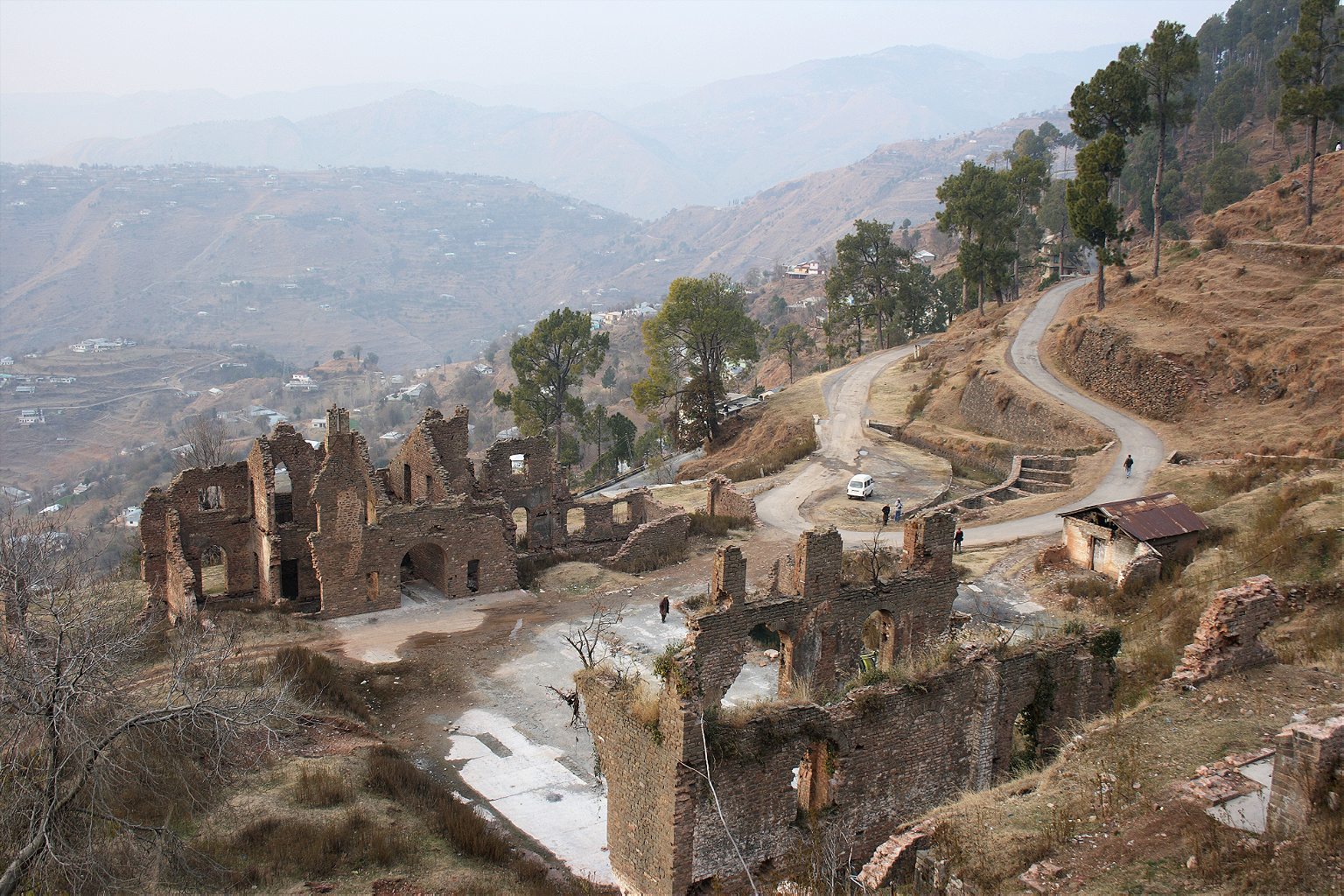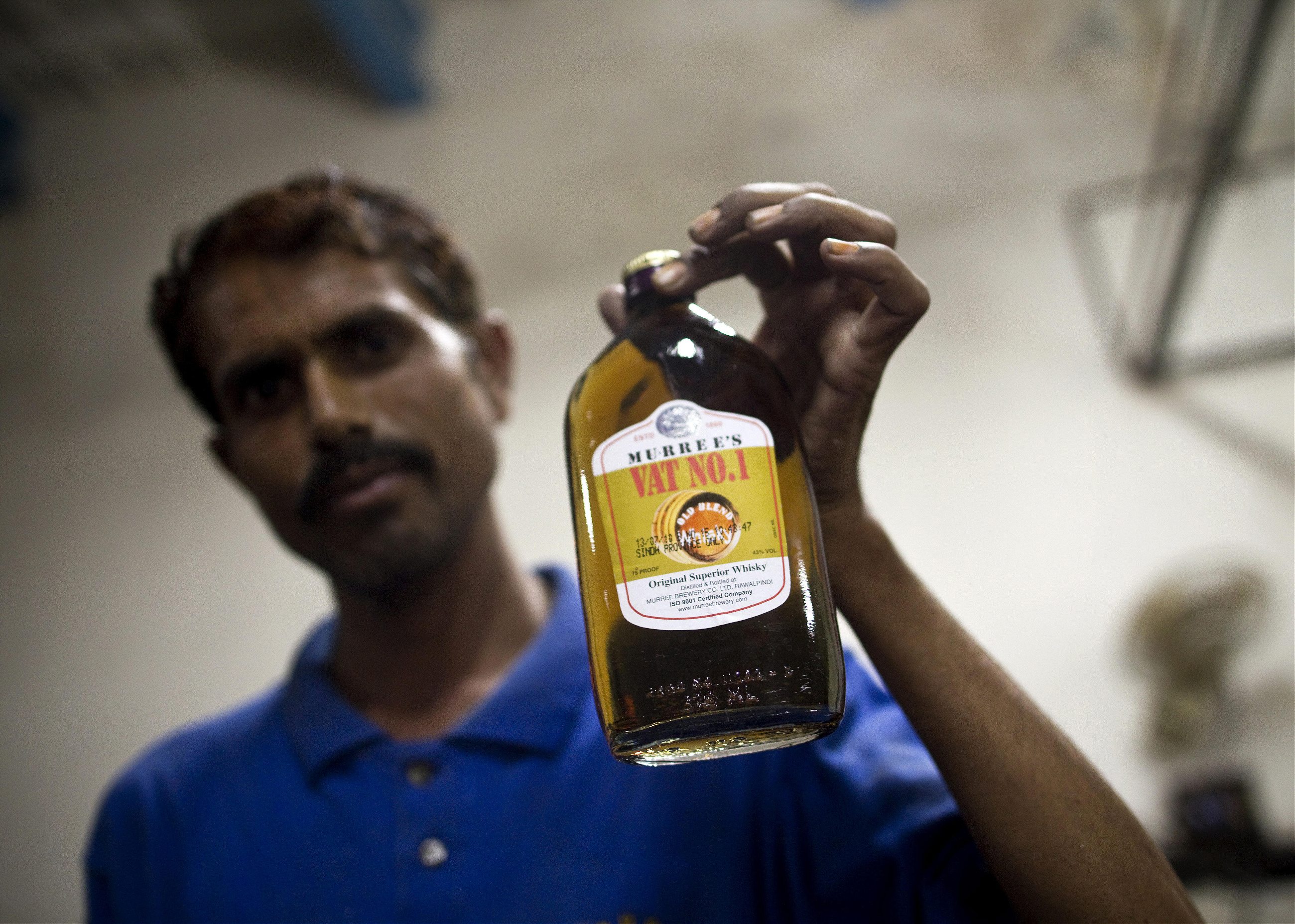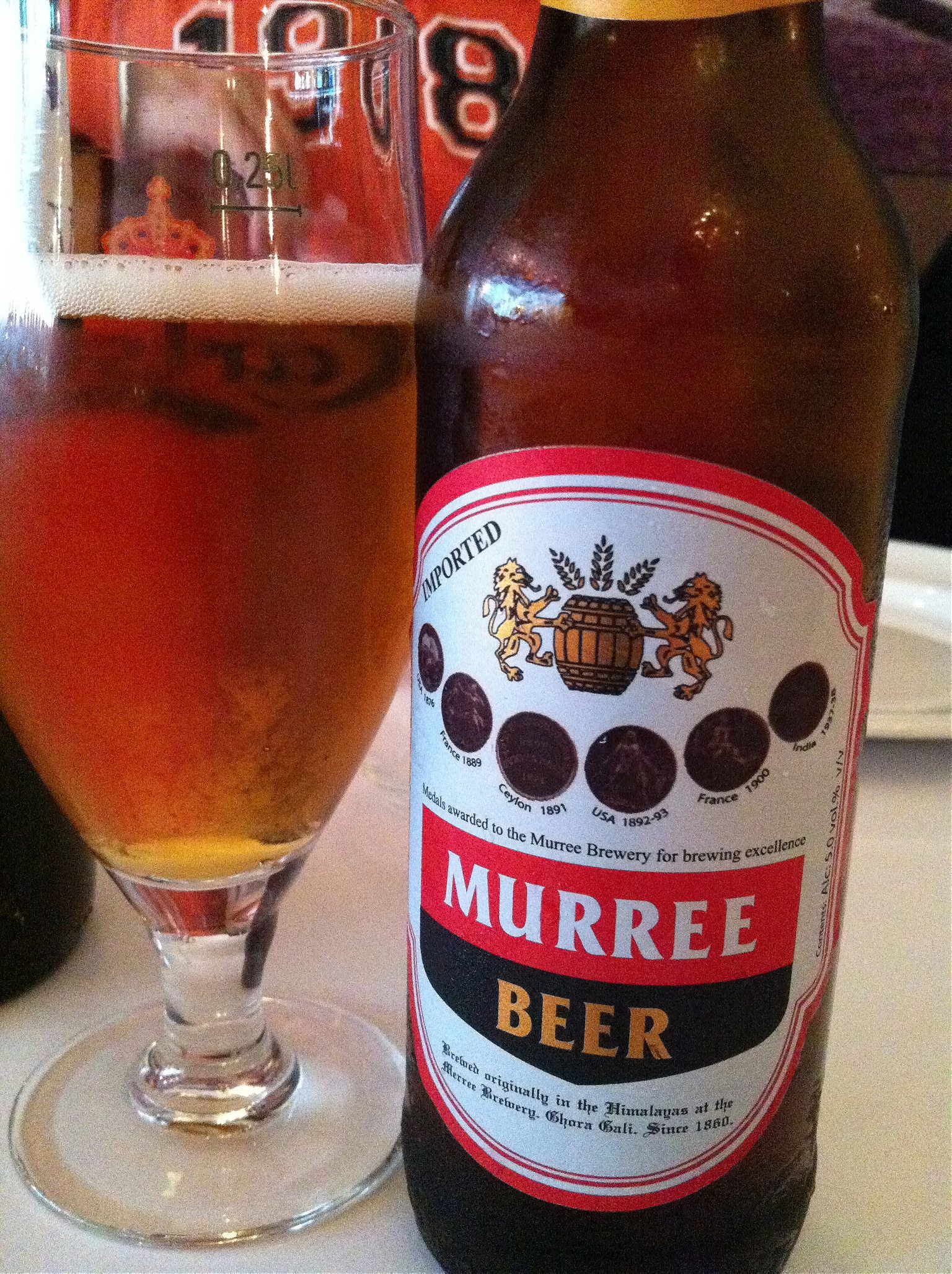Is Murree Beer the joyous bond that can unite a fractious nation? No.
In the congested Saddar area of Karachi, on a busy street lined with restaurants and cafeterias, rests the Lucky Star Wineshop. It’s not advertised as a place of alcoholic purveyance, but it’s not exactly hidden. A man stumbles up the shop’s steps and passes an empty water bottle through a small, grated window in the wall. He demands, slurring, that he be given a “quarter” refill of whisky: a pawwa, as it’s known in Pakistan.
He also says he doesn’t have any money on him, but he promises to pay tomorrow. The window clerks try their best to send him away. After a while, he curses at them and produces two 100-rupee notes, shouting that he’ll be back for more later in the evening.
Another man walks up to the grated window. He’s visiting from Kerala, India, and he’s enamored by all the different colors Murree Beer comes in. “I wasn’t expecting such a selection,” he keeps laughing. He wants to try the white ones. Silver, the window clerk corrects him. They look white, he insists. The debate is resolved when he orders the light-blue cans instead; Murree Wheat.
Murree Brewery is the largest manufacturer of alcohol in Pakistan, and the only one that brews beer. Established in 1860, the brewery’s bittersweet malt was made by the British to quench their thirst for ale. In the 1940s, it was bought by the Parsi religious community’s Bhandara family. The current owner, Isphanyar Bhandara, considers it part of the country’s rich cultural tapestry.

In the Islamic Republic of Pakistan, alcohol is both a provocation and a banality, both a grave sin and a ubiquitous presence at get-togethers, weddings, and leftist conventions. Some Muslims don’t drink, others imbibe freely. Dozens of people die from alcohol poisoning every year during celebrations around Eid.
Select shops are licensed to sell locally manufactured liquor to non-Muslims, but people of the faith also come to these shops and walk away with their purchases wrapped in brown paper bags, which themselves are wrapped in blue or red polythene. Pakistanis who go abroad often get hammered at bars, then hobble through the streets of an alien city seeking a halal food restaurant. It’s a perplexing paradox.
Pakistan has a long and complicated history with alcohol. Despite the religious taboo, we remain a dedicated nation of drinkers. The founding father, Muhammad Ali Jinnah, drank; the first democratically elected prime minister, Zulfiqar Ali Bhutto, did as well. He was also the one who prohibited drinking in 1977, after which a totalitarian teetotaler, Muhammad Zia-ul-Haq, made it punishable by 80 lashes in 1979; the next military dictator, General Parvez Musharraf, drank in enlightened moderation.
I had my first drink at 16 in Lahore, where I also live today. Since it’s against the law, there is no legal drinking age. The drink was a blended Murree Brewery whisky called Vat 1. It comes in a balloon-necked bottle shaped much like the iconic blended Scotch, Vat 69. The legend goes that distiller William Sanderson made 100 batches of whisky and picked the number that tasted the best, the eponymous 69. Murree, apparently, got it right in one.
The spirit filled my room, and my life, with a pungent, mildewed odor. My cousin and I consumed the entire bottle between ourselves and proceeded to take turns throwing up in the loo. Vat 1 has been discontinued since, possibly because all its consumers are dead.

That was a good lesson to learn early: Murree makes brilliant beer and uneven liquor. Their beer is certainly the more popular product. “We notice that strong beers are in high demand in the subcontinent,” says Bhandara.
Murree’s brews get the royal treatment. “We import hops from various European countries,” says Bhandara. They make seven different types of bitters, ranging from the 2.5 percent alcohol by volume Light Pils to the appropriately named Murree Strong, which rings in at 8 percent.
Not satisfied with the punch packed by their 7.5 percent ABV beer, called Millennium, they came out with Strong only a couple of years ago. True to its name, it’s the only beer that can cause retrograde amnesia. At that alcohol percentage, it’s less of a beer and more of a carbonated liquor.
But consumers love it. “I just want to get drunk as cheaply and quickly as possible,” is a frequent endorsement. For a lot of alcohol consumers, storage simply isn’t an option. Carrying it around runs the risk of being caught by disapproving family members or having to pay off the cops.
In 2012, the daughter of Hollywood stars Demi Moore and Bruce Willis was caught drinking Murree Beer in New York City; while she fought the charge, the brewery was thrilled to be in the limelight, a person familiar with the company told me. In the wake of that publicity it wanted to open up to distributors in Texas, Dubai, and Denmark under franchise agreements, but nothing has materialized so far.
In 2013, the brewery did start a franchise in Bangalore, India, but because of the never-ending political tensions between the two countries, their partners found promoting a Pakistani product very difficult. That doesn’t stop it from sometimes creeping across the border illegally.
In 2011, I went to India to see the cricket World Cup semi-final between Pakistan and India. Islam and Hinduism are hobbies in the subcontinent; cricket is the true religion. Pakistan lost and I was devastated, but the local pubs in Chandigarh announced that all alcohol was now on the house. My mood considerably elevated, I was sitting with a gigantic liter bottle of Kingfisher Beer, an Indian brew, when a drunk Indian man put his arm around my shoulder, offering consolation. He slurred that they could best us in cricket, but could never best us in beer. “I’ve had your Murree,” he said. “It beats the crap out of this.”

Murree’s other products aren’t as revered.
For their vodka, they invoke Russia, of course. First came Petroskaya, a musky paint thinner, then Kinnoo Vodka (orange vodka), which was a crime against humanity up there with mullets and calling water polo a sport. Then came Bolskaya.
Now, Russians presumably drink vodka in part to stave off the cold. In Pakistan, the summer temperatures can hit the high 40s in Celsius, around 100 degrees Fahrenheit. On our college budgets, using our college brains, we used to take neat Bolskaya shots in the boiling summer heat. It was like drinking fire. It took many years for Murree to introduce its first humane distillation, simply called Murree Vodka. Triple distilled, 20 percent ABV, and perfectly drinkable. No Grey Goose, but no glorified moonshine either.
To its credit, Murree Brewery makes a solid 12-year single malt Scotch and released a limited edition of a fantastic 21-year single malt. It also used to make an excellent Bailey’s Irish Cream imitation, but, as Bhandara explains, “We had to discontinue producing it as people did not understand the product. In Pakistan, people are familiar with vodkas and whiskies.” The brewery isn’t allowed to advertise its products so introducing an unknown quantity is difficult, and there are natural limitations on production because of the limited licensing.
To its discredit, Murree Brewery makes a poor Bombay Sapphire Gin imitation. Instead of the bottle being blue, it’s the liquor itself that looks—and tastes—like detergent. Their Smirnoff Green Apple imitation is more passable, but again, instead of the bottle being green, the hue is given to the liquor inside.
Once you move on from Murree’s, things go downhill quickly. Murree Brewery’s local competition is Quetta Distillery and a company formerly known as Indus Distillery and Breweries, now Mehran Distillery and Breweries. But the competition isn’t up to scratch.
Quetta Distillery made a whisky, now discontinued, that tasted like cotton. I can still taste it after all these years. Mehran Distilleries and Brewery makes Lava Vodka. Lava by name, lava by nature. It burns almost everything inside. It comes in various flavors, including citrus and peach. They all taste the same: vile. Drinking Lava Vodka is like drinking nail polish. My friends and I do shots of it when our self-loathing reaches a certain critical threshold.
Partly due to this dearth of quality, and partly due to reasons of status and snob value, the elite prefer imported liquor.
North Korean diplomats were caught selling alcohol using embassy vehicles.
Importing liquor is banned under the Import Policy Order (IPO) but there are exemptions for the foreign diplomatic missions in Pakistan under the Diplomatic and Consular Privileges Act of 1972. This exemption is authorized by the Foreign Office and Ministry of Commerce.
Annual customs records show hundreds of monthly consignments for Heineken, Carlsberg, Stella, Foster’s, Bordeaux, Chateau, Grey Goose, Johnnie Walker, Black Label, Bacardi, among a multitude of other drinks, all labelled under “exemption for diplomatic goods.” Certainly no one who entertains guests can argue against alcohol being diplomatic.
Earlier this year, North Korean diplomats in Pakistan were caught attempting to import 855 cases of duty-free alcohol into the Islamic Republic, exceeding their approved import quota of 445 cases. In 2013, North Korean diplomats were caught selling alcohol using embassy vehicles. In early 2002, before the repercussions of the War on Terror pushed most of the foreign embassies in Islamabad inside a walled enclave, I remember driving up to the Thai Embassy, which was famous for selling liquor.
My friends and I were told that all we had to do was stop at the gate and flick our headlights. A guard came to take our order. We got three-dollar Heinekens for the exorbitant price of five dollars each and felt pretty good about ourselves.
Getting alcohol is a bit of a hassle in Pakistan, and once acquired, it needs to be consumed quickly. Murree Brewery constitutes the only legal, taxable chunk of this otherwise undocumented alcohol consumption. To date, Murree’s beer is the only alcohol I’ve had in all provinces of Pakistan. It’s probably not the joyous bond that finally unites a fractious nation, but it’s more reliable than our cricket team, that’s for sure.